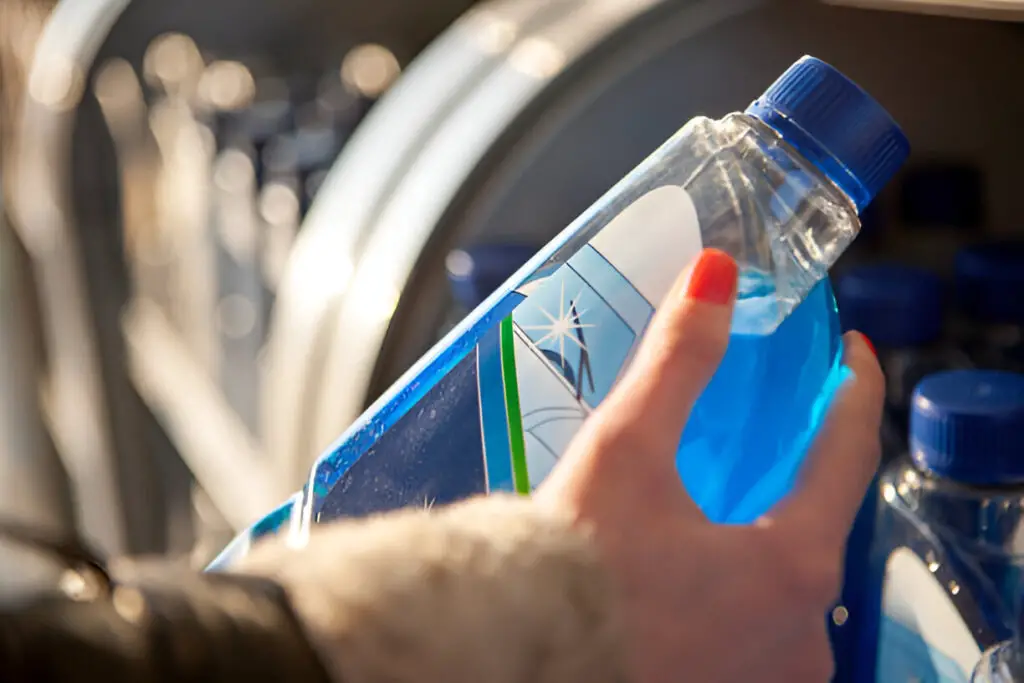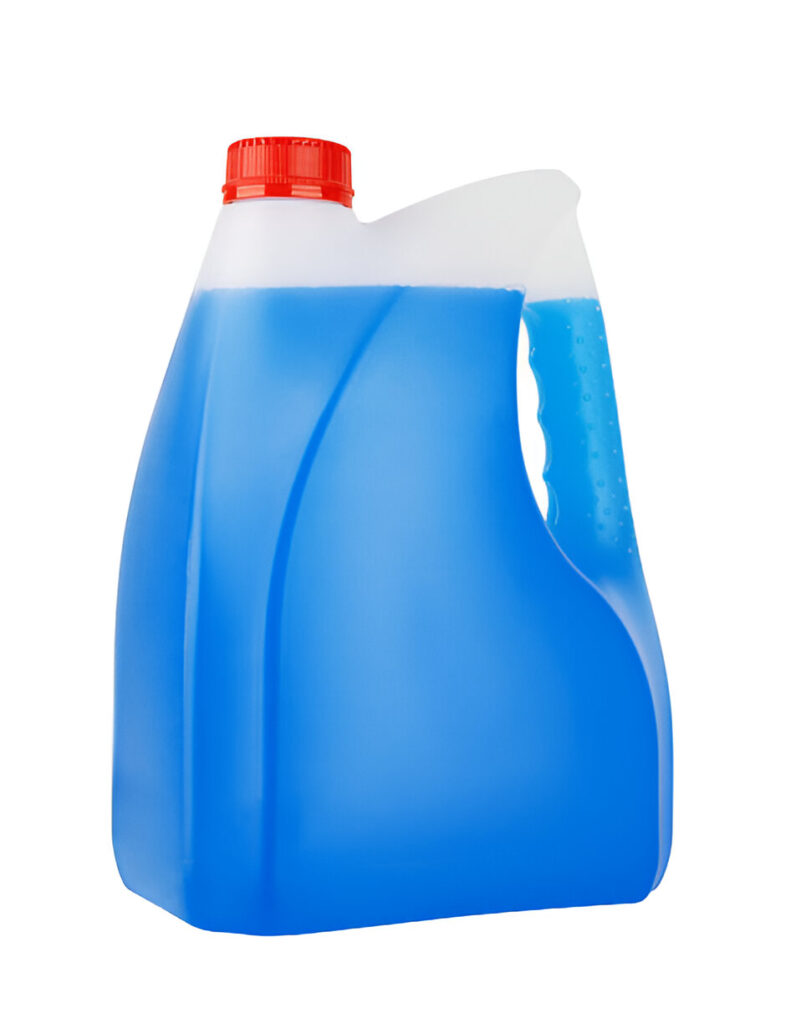Yes, windshield washer fluid is toxic, primarily due to its methanol content, which can be harmful if ingested, inhaled, or absorbed through the skin. Exposure can cause symptoms like nausea, dizziness, vision problems, and in severe cases, organ failure.
Windshield washer fluid is an essential component for maintaining clear visibility while driving. It helps remove dirt, grime, bugs, and other debris from your windshield, ensuring safe driving conditions. However, while windshield washer fluid may seem like an innocuous liquid, it’s important to understand that it contains several chemicals that can be highly toxic if ingested or mishandled.
This article will explore the composition of windshield washer fluid, the risks associated with its toxicity, and what precautions you should take to ensure safe handling.

Contents
What is Windshield Washer Fluid?
Windshield washer fluid is a specialized liquid designed to clean your vehicle’s windshield when sprayed through the washer system. It typically contains a mixture of water, methanol, and other cleaning agents such as detergents and anti-freezing compounds. Some products may also contain additional chemicals like ethanol, isopropanol, or ethylene glycol to improve cleaning performance or prevent freezing in colder climates.
Common Ingredients
The ingredients can vary slightly based on the specific type (summer, winter, or all-season fluid), but here are the most common components found in windshield washer fluid:
- Methanol (Methyl Alcohol): The most common ingredient in windshield washer fluid, methanol is a toxic alcohol that helps prevent the liquid from freezing and assists in cleaning the windshield.
- Ethylene Glycol or Propylene Glycol: These chemicals are used in some washer fluids to lower the freezing point, especially in colder regions.
- Isopropanol (Isopropyl Alcohol): Also present in many washer fluids, isopropanol enhances the fluid’s cleaning properties and prevents it from freezing.
While these ingredients are effective at their intended purpose, they also pose significant health risks, especially methanol and ethylene glycol, both of which are toxic to humans and animals if ingested.
Is Windshield Washer Fluid Toxic?
Yes, windshield washer fluid is toxic, primarily due to its methanol content. Methanol is a highly toxic alcohol that can be absorbed through the skin, inhaled as vapor, or ingested accidentally. Even small amounts of methanol can cause serious health issues, including headaches, dizziness, nausea, vision problems, or in severe cases, organ failure and death.
1. Methanol Poisoning
Methanol poisoning occurs when methanol is ingested or absorbed in significant quantities. Unlike ethanol (the alcohol found in alcoholic beverages), methanol is not metabolized safely by the body. When ingested, methanol is converted to formaldehyde and formic acid, both of which are extremely toxic to the body’s central nervous system, optic nerves, and liver.
Symptoms of Methanol Poisoning:
- Blurred vision or vision loss
- Nausea and vomiting
- Dizziness and headaches
- Abdominal pain
- Difficulty breathing
- Confusion or drowsiness
- Seizures or unconsciousness in severe cases
2. Ethylene Glycol and Isopropanol:
Although methanol is the primary concern, windshield washer fluids that contain ethylene glycol or isopropanol also pose toxicity risks. Ethylene glycol is particularly dangerous because it is sweet-tasting, making it attractive to pets and young children. Ingestion of ethylene glycol can result in severe metabolic acidosis, kidney failure, and even death.

Risks of Exposure to Windshield Washer Fluid
The toxicity of windshield washer fluid can pose risks in various scenarios, including:
1. Accidental Ingestion
One of the most common risks, especially in households with children or pets, is accidental ingestion. Children may mistake the bright blue color of windshield washer fluid for a sports drink, or pets may lick spilled fluid off the ground. Even a small amount can lead to poisoning, and immediate medical attention is necessary.
2. Inhalation of Vapors
While using windshield washer fluid, especially in poorly ventilated areas or while topping off the fluid in the car, inhaling the vapors can result in respiratory irritation, dizziness, and nausea. Prolonged exposure to high levels of methanol vapors can contribute to more serious health issues.
3. Skin Contact
Direct skin contact with windshield washer fluid, especially if prolonged, can result in skin irritation, dryness, and in rare cases, methanol poisoning. Although methanol is not absorbed through the skin as quickly as ingestion, repeated or significant exposure can still lead to health problems.
4. Environmental Risks
Washer fluid that spills into the environment can contaminate groundwater and harm wildlife. Methanol and ethylene glycol are particularly dangerous to aquatic life and can have long-lasting effects on ecosystems.
Safety Precautions to Minimize Risks
Given the toxicity of windshield washer fluid, it’s essential to take the proper precautions to minimize risks to yourself, your family, and the environment.
Safe Storage: Always store windshield washer fluid in its original container, tightly sealed, and out of the reach of children and pets. Avoid transferring the fluid to other containers that may be mistaken for food or drink.
Proper Handling: When handling windshield washer fluid, avoid direct skin contact and consider wearing gloves. Ensure you are working in a well-ventilated area to minimize the risk of inhaling vapors, and be cautious to avoid spills or splashes.
Disposal of Old Washer Fluid: Never pour windshield washer fluid down the drain, into the soil, or into water sources. Instead, dispose of old or unused fluid at a hazardous waste disposal facility to prevent environmental contamination.
First Aid Response:
- Ingestion: If someone accidentally ingests windshield washer fluid, do not induce vomiting. Call a poison control center immediately or seek emergency medical attention.
- Inhalation: If inhalation of vapors occurs, move to fresh air immediately and seek medical help if symptoms like dizziness, nausea, or respiratory issues persist.
- Skin Contact: Wash the affected area with soap and water, and remove any contaminated clothing. If skin irritation continues, seek medical advice.
Use of Non-Toxic Alternatives: For those concerned about the potential risks, non-toxic or eco-friendly windshield washer fluids are available. These products are often free from methanol and use safer chemicals like propylene glycol, which is less toxic. While they may be slightly more expensive, these alternatives offer peace of mind, especially for households with children and pets.
Frequently Asked Questions
Here are some FAQs about windshield washer fluid –
1. Can windshield washer fluid cause harm if ingested in small amounts?
Yes, even small amounts of windshield washer fluid, particularly those containing methanol or ethylene glycol, can be harmful if ingested. Symptoms of poisoning include nausea, vomiting, dizziness, and vision problems. Immediate medical attention is recommended.
2. What should I do if my child accidentally drinks windshield washer fluid?
If your child accidentally ingests windshield washer fluid, do not attempt to induce vomiting. Call your local poison control center or emergency services right away. Time is crucial when dealing with methanol poisoning.
3. Is windshield washer fluid dangerous to pets?
Yes, windshield washer fluid can be extremely dangerous to pets, particularly due to the ethylene glycol content in some products, which is highly toxic. If you suspect your pet has ingested even a small amount, seek veterinary care immediately.
4. Can I use water instead of windshield washer fluid to avoid toxicity?
While water can be used temporarily, it doesn’t clean as effectively as windshield washer fluid, particularly in removing grease, bugs, or frost. Water also freezes in cold temperatures, which can damage your car’s washer system. Non-toxic washer fluids are a safer and more effective alternative.
5. Are there any non-toxic alternatives to traditional windshield washer fluid?
Yes, there are non-toxic and eco-friendly alternatives to conventional windshield washer fluids. These alternatives often use safer chemicals like propylene glycol, which are less harmful to humans, animals, and the environment.
Conclusion
While windshield washer fluid is an essential product for maintaining visibility and safety on the road, it’s important to be aware of its potential toxicity. The methanol and ethylene glycol found in many formulations can pose significant health risks to humans, pets, and the environment if not handled correctly. Always store it properly, handle it with care, and consider using non-toxic alternatives if you have children or pets in your household.